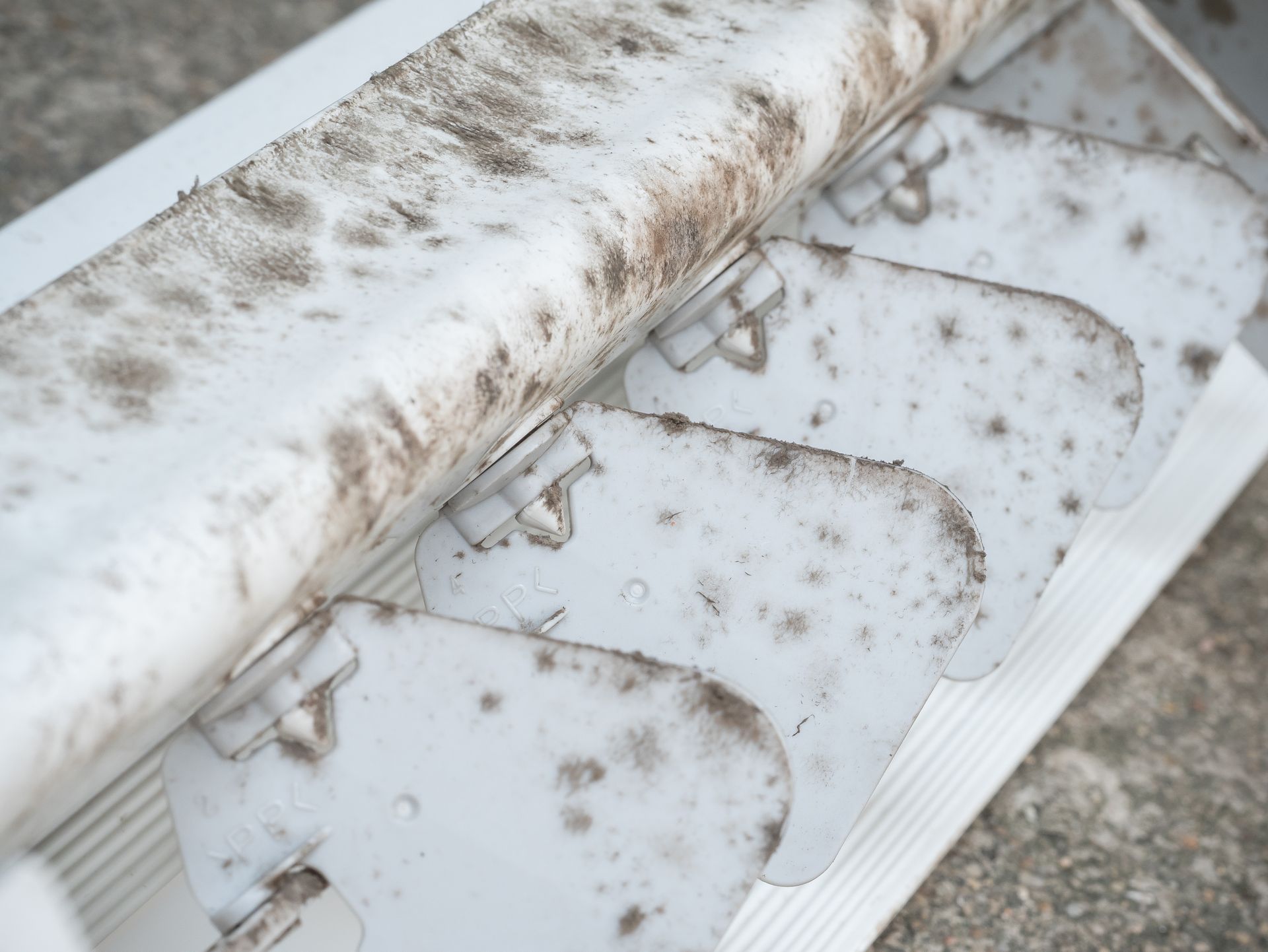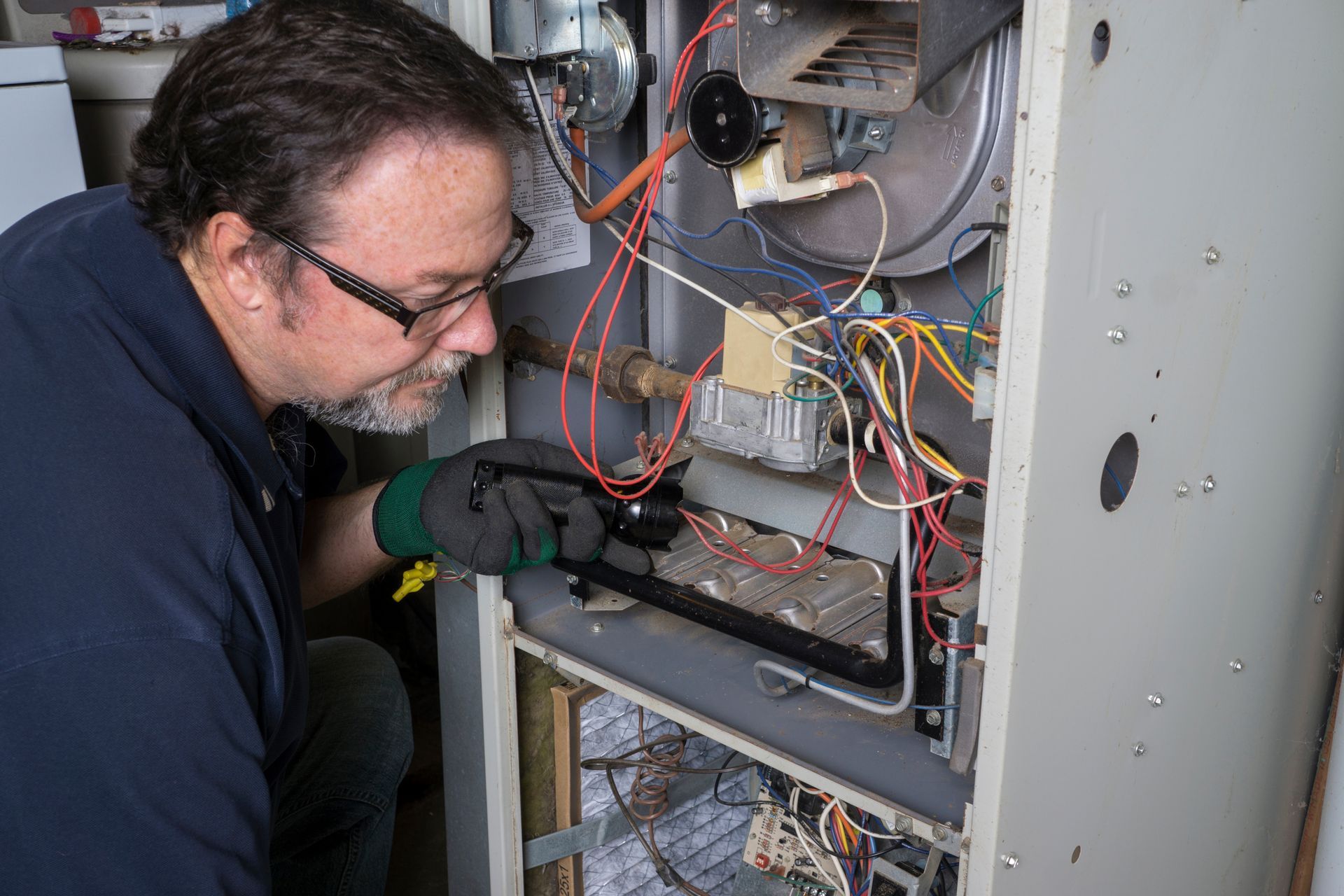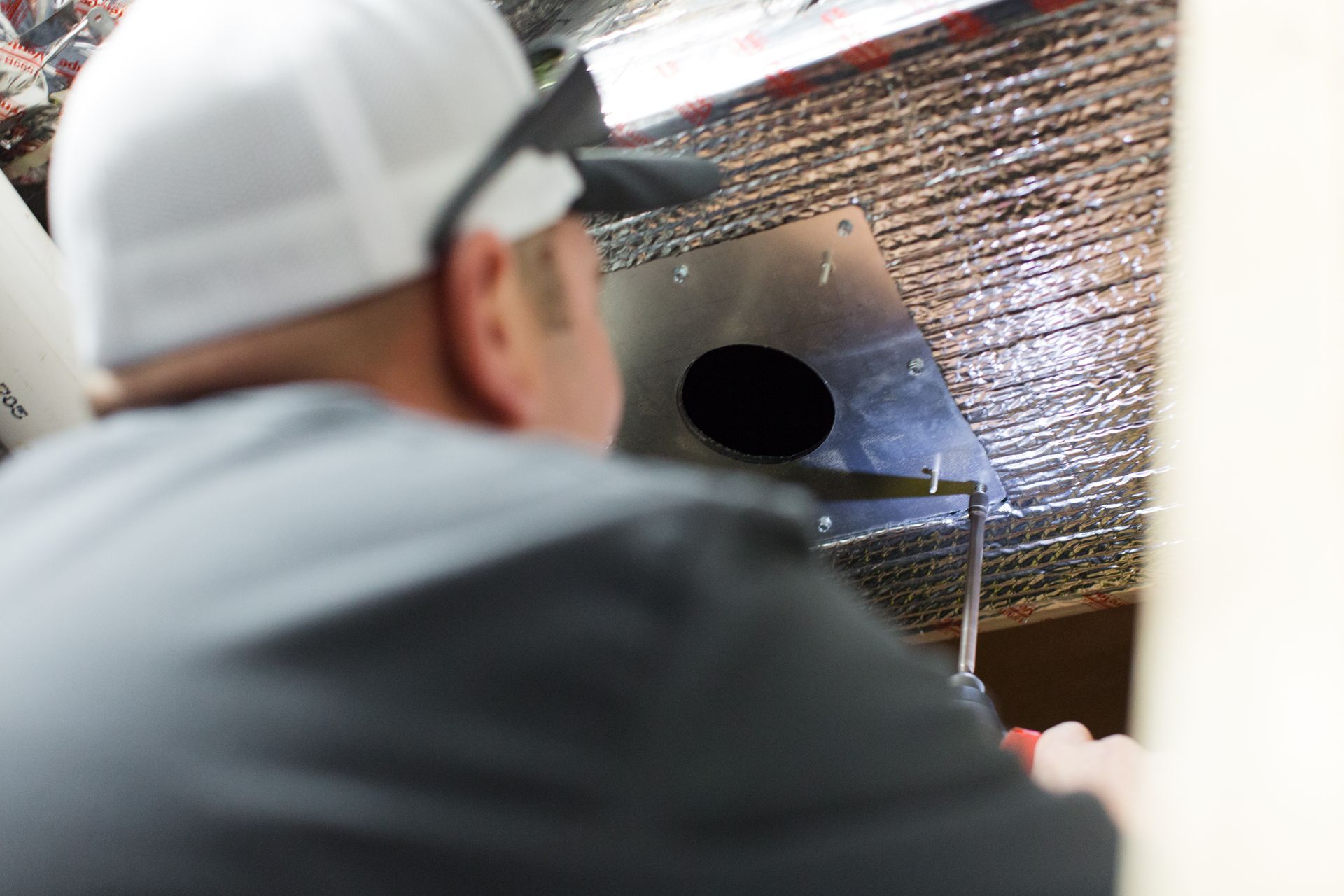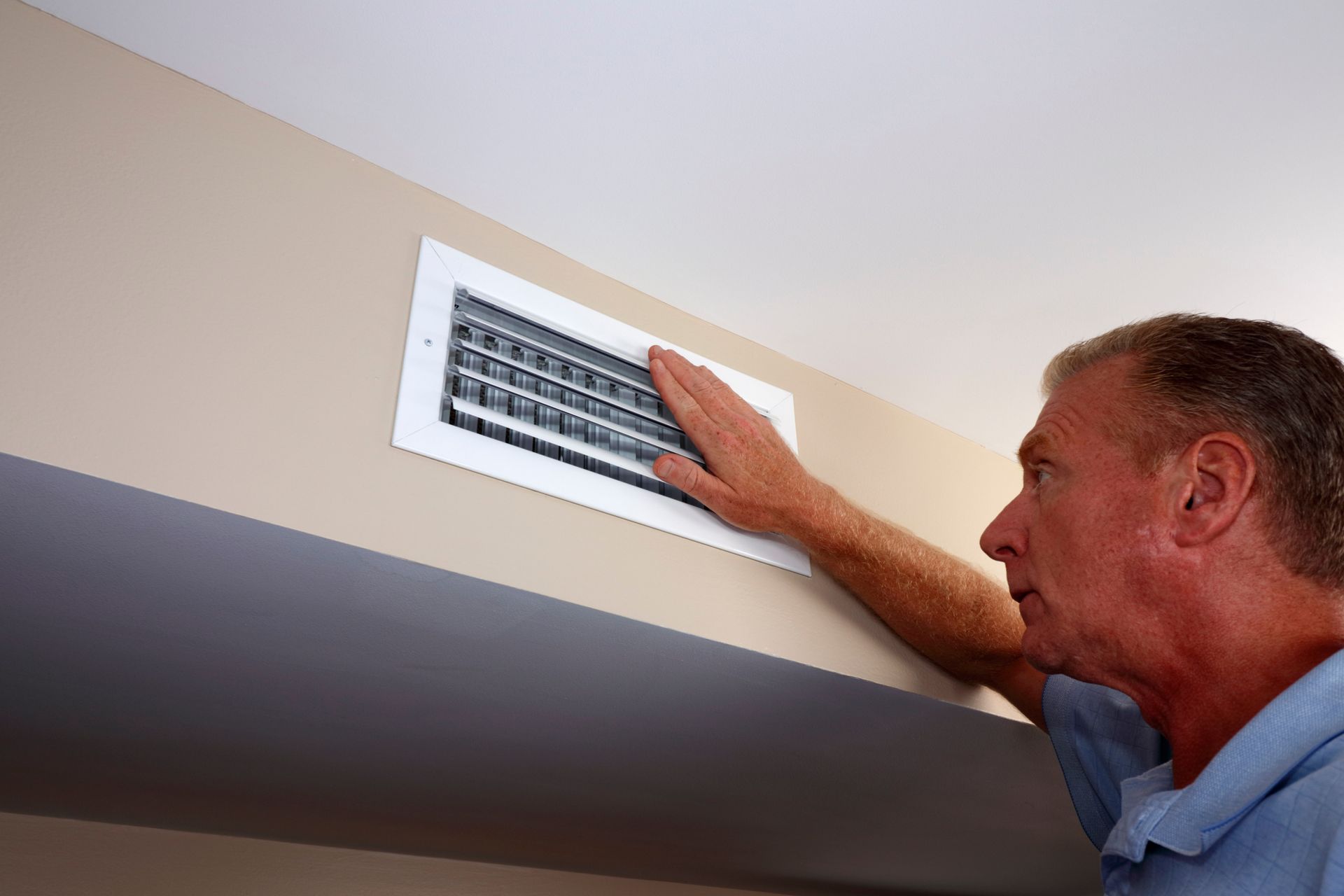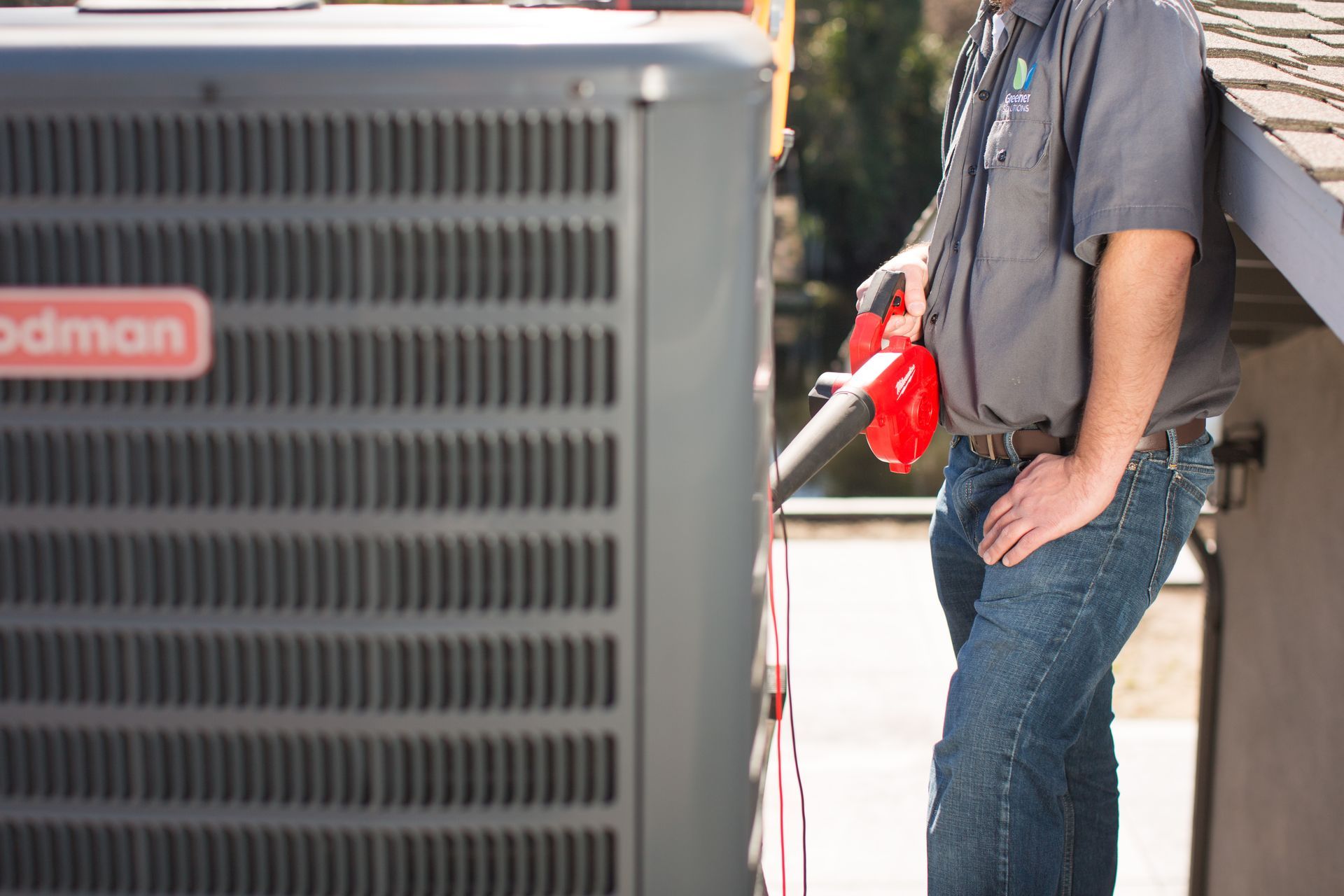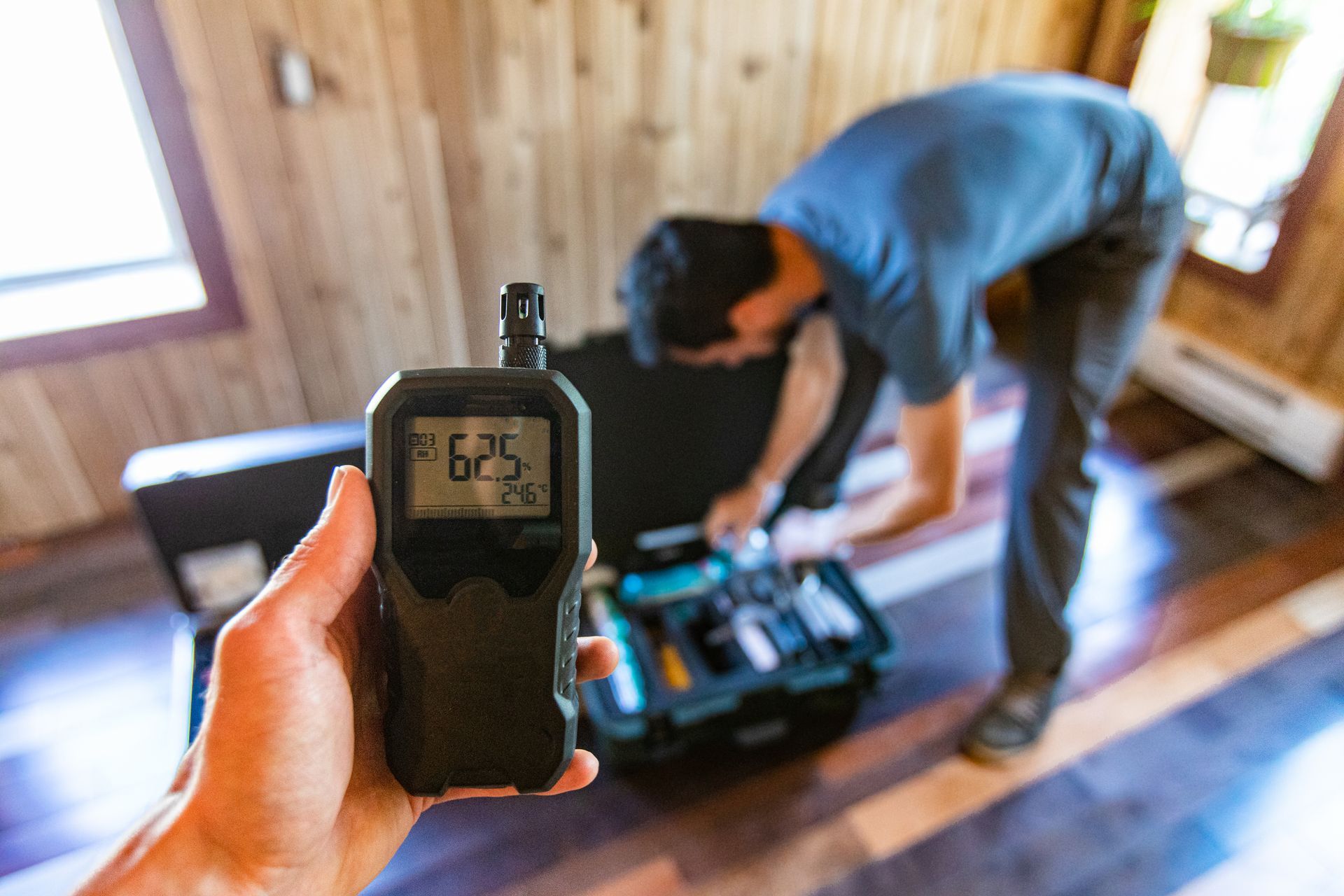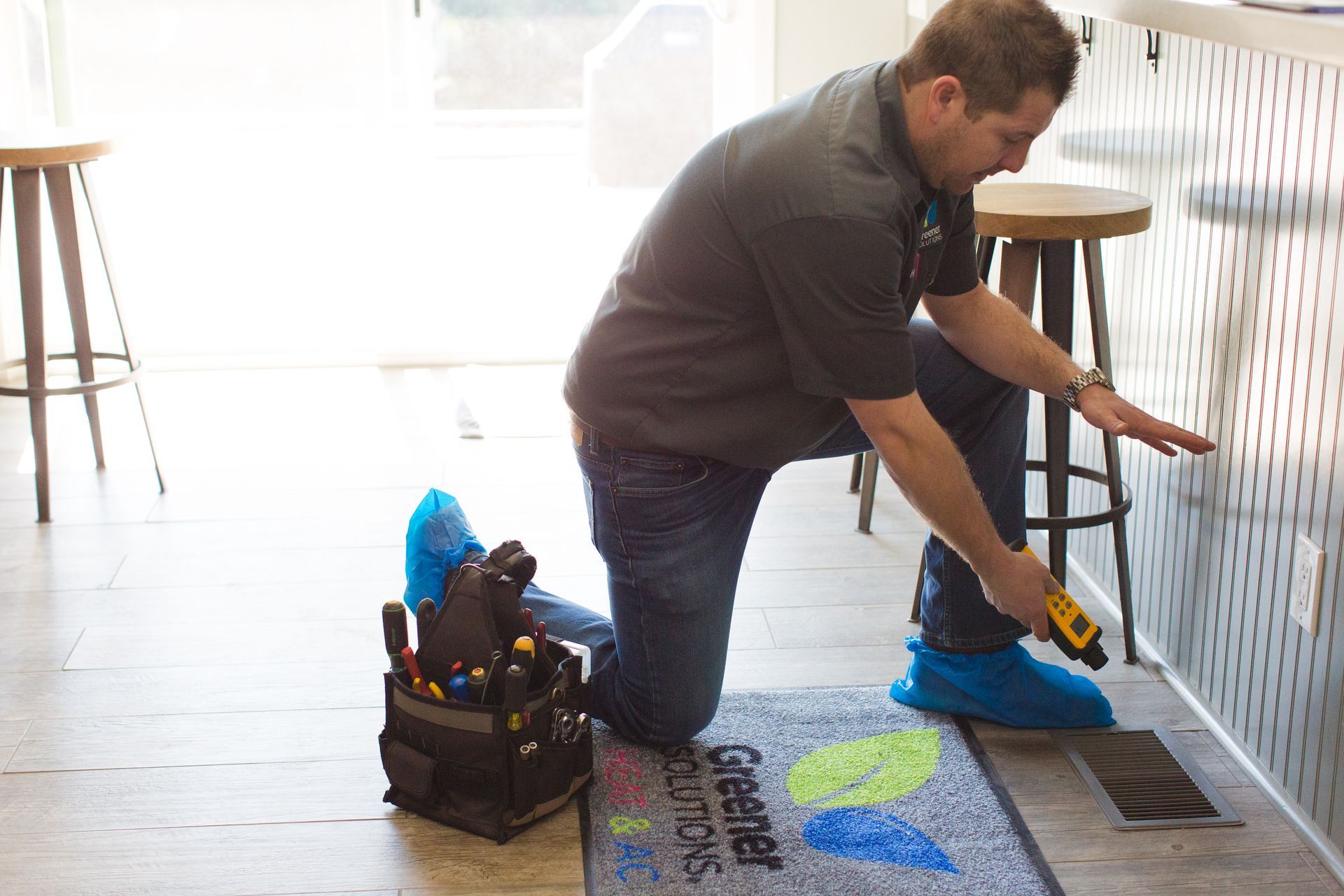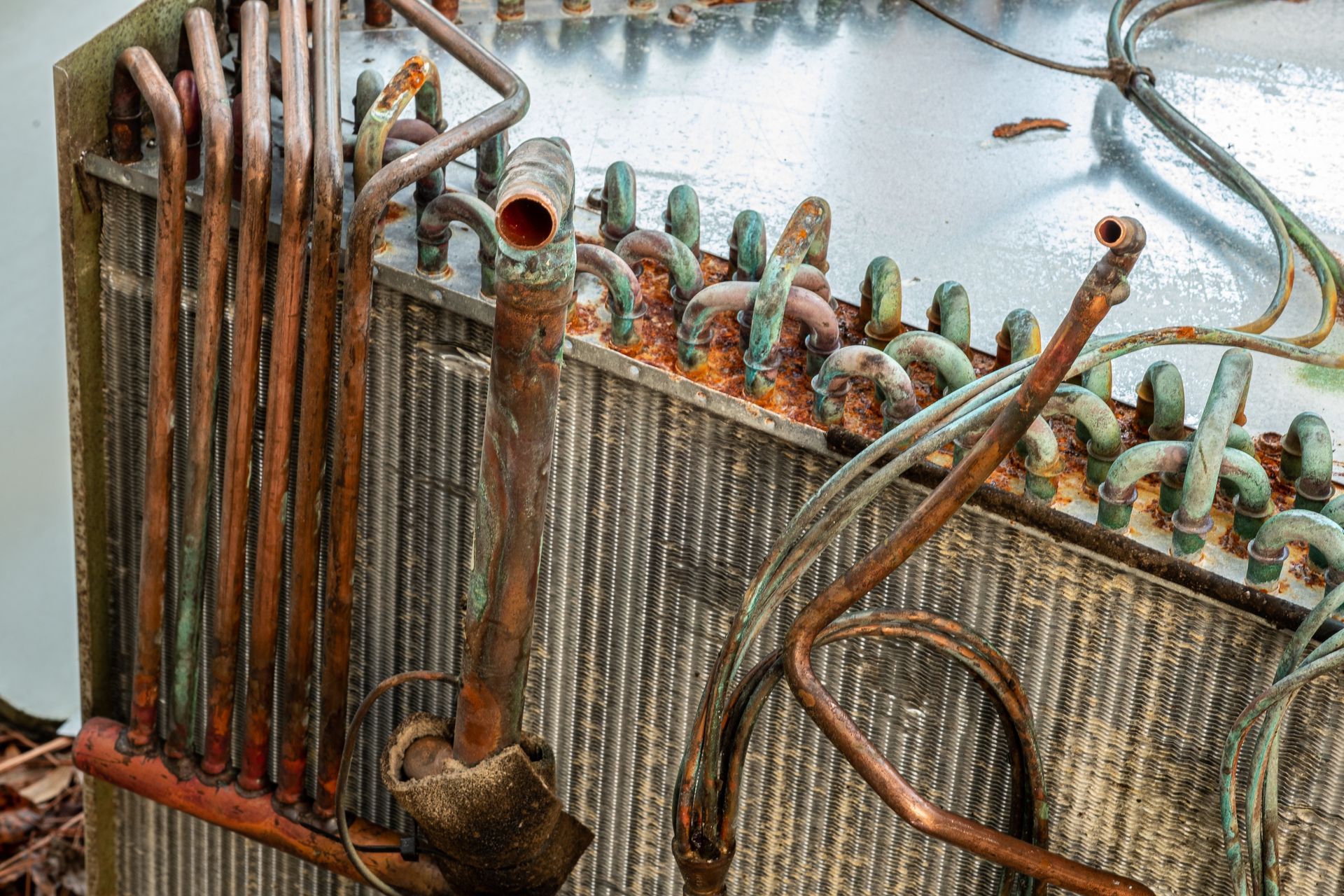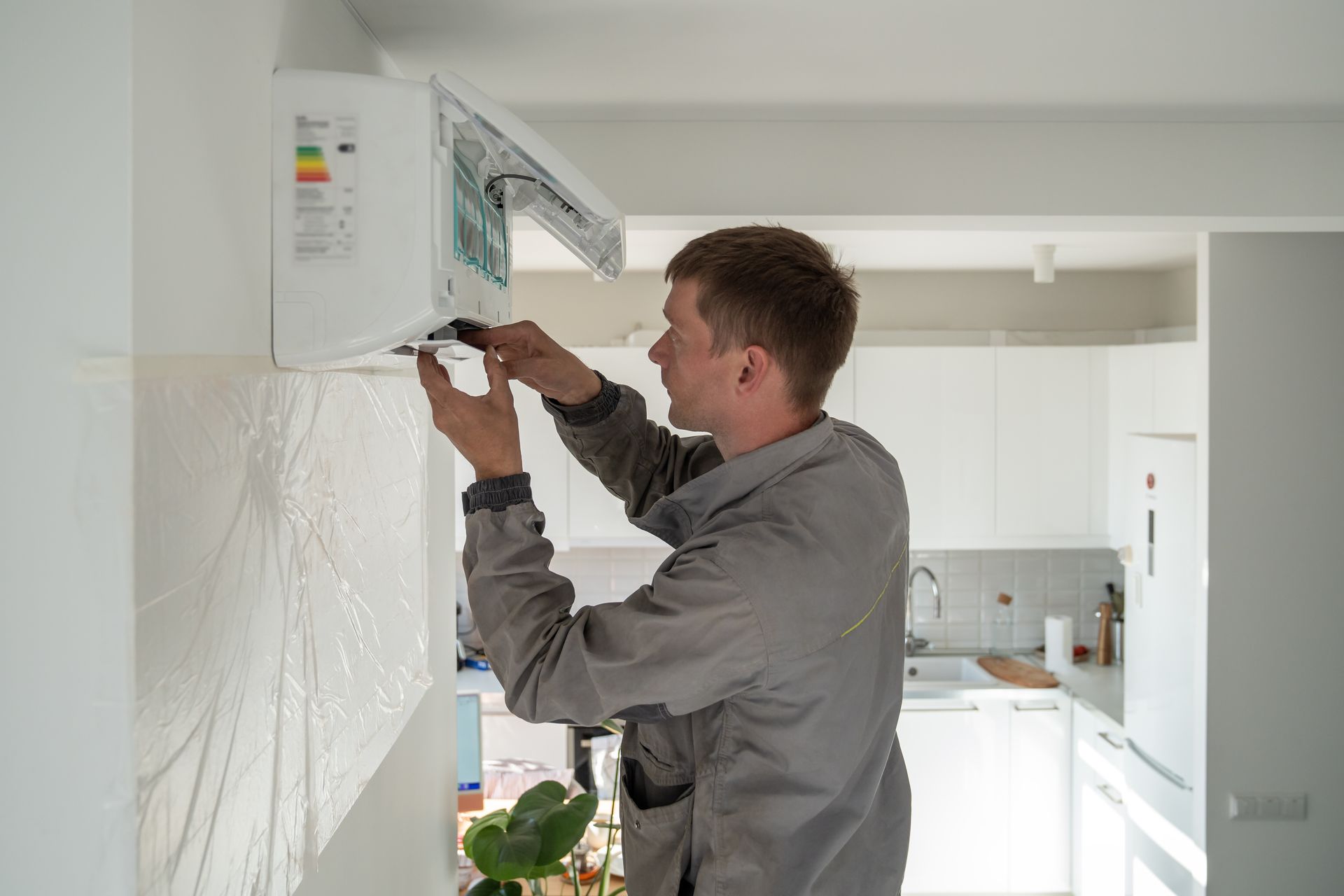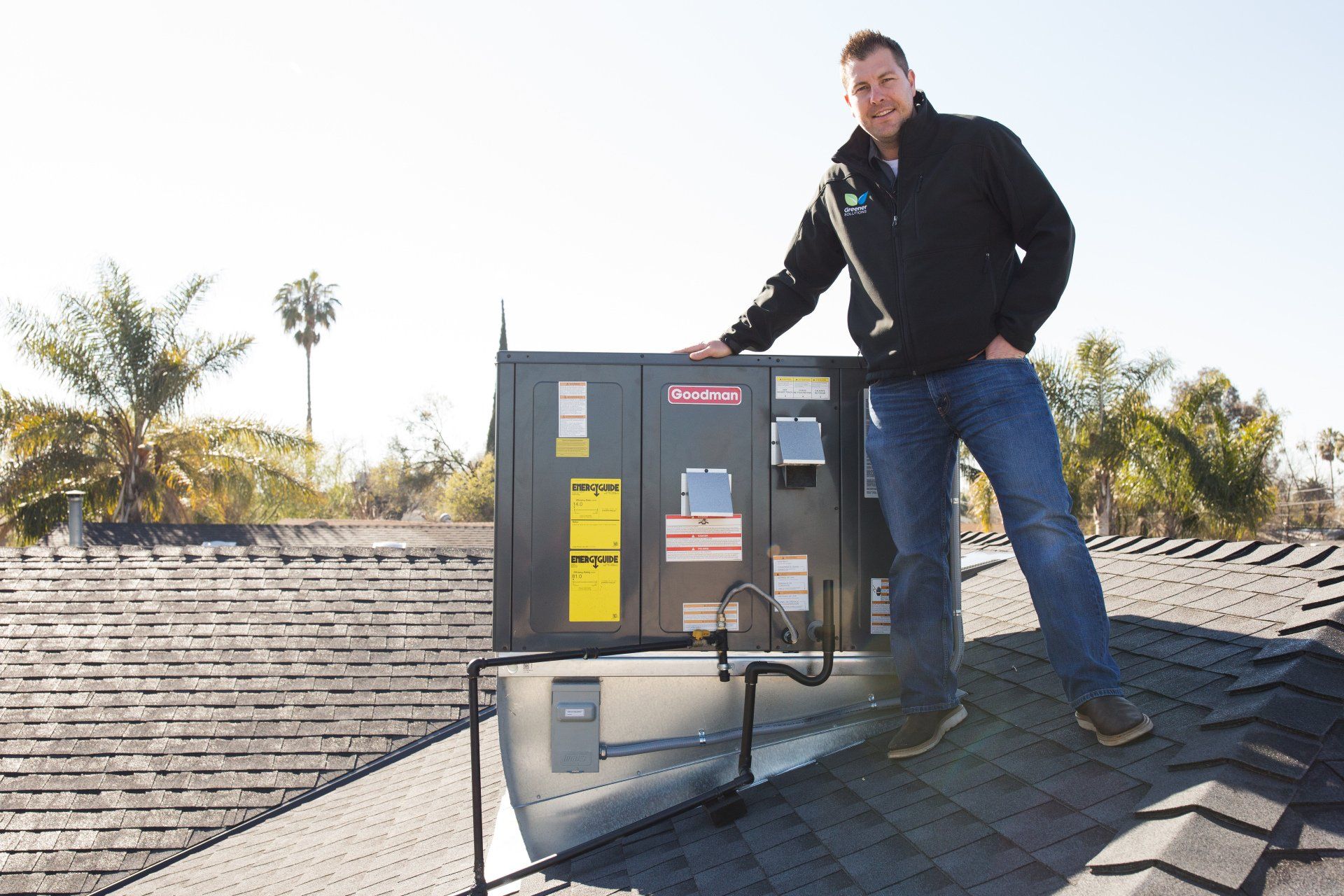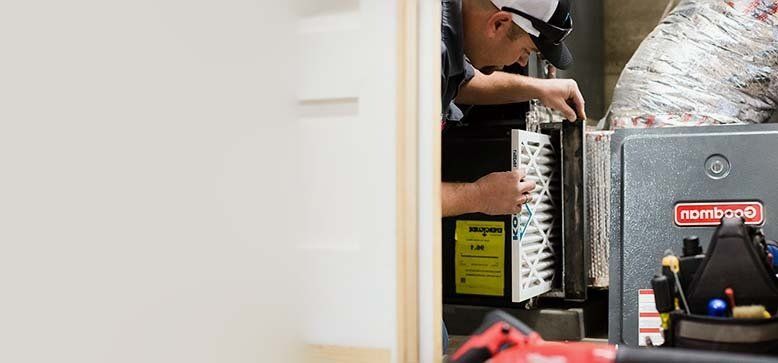Why is My AC Fan Not Spinning?
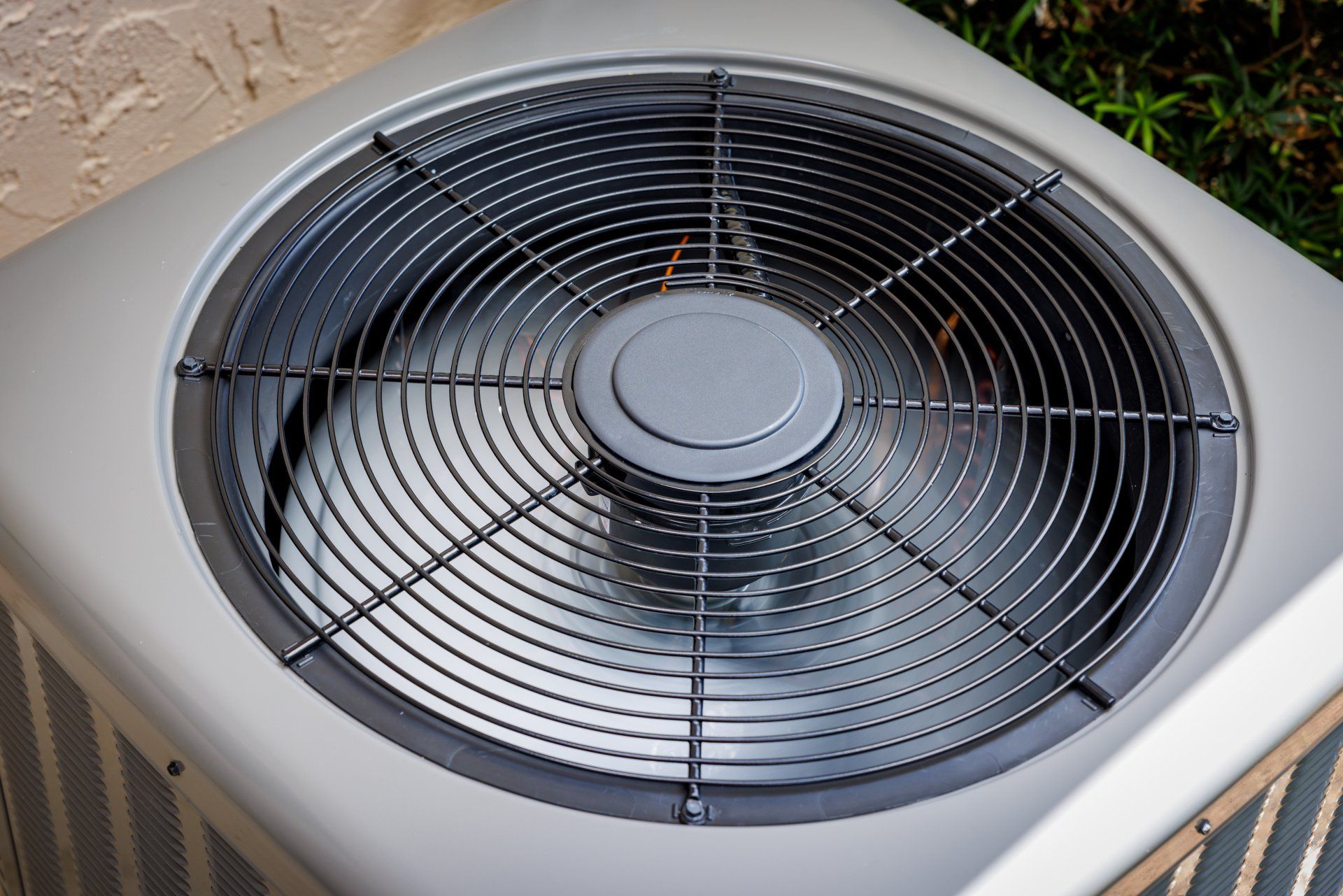
The AC fan inside of an HVAC unit connects to the air handler and is responsible for moving air through the HVAC system. When the settings are set to cool, the fan draws in warm air and passes it over the evaporator coils where the air is cooled before the fan pushes the cool air out and disperses it into a building. If the internal fan is not spinning, the AC unit won’t be effective because the flow of air will stop, and the home will remain warm. There is also another AC fan on the outside unit that helps disperse heat that is released from the HVAC system. There are several reasons why these AC fans might stop working which often require a professional to inspect the unit to diagnose the problem. Be sure to enlist the help of the professionals at Greener Solutions Home Services to check your HVAC fan if it stops working.
How AC Fans Work
Both AC fans are rotated by fan motors that are powered by a capacitor. If the capacitor and fan motor are working, the fan blades will rotate. The internal AC fan is placed strategically inside of an HVAC system, so it draws warm air in from the indoor environment. This warm air is passed over evaporator coils that contain refrigerant which cools the air. As circulating air is cooled down by the cold coils, the air will continue to pass through the ductwork before the different vents blow cold air inside of a home. The outdoor fan is designed to blow air over the condenser coils to help disperse the heat that was collected in the refrigerant. If you look at the how AC fans work within the HVAC unit, the fans act like the lungs. The indoor fan inhales warm air while the outdoor fan exhales warm air.
Common AC Fan Problems
There are several air conditioner fan problems that can present themselves. Some may be the result of a power problem while others could be caused by failing components. The 3 problems listed below are the most common AC fan problems that most HVAC unit owners must deal with:
AC Fan Not Spinning
If the AC fan is not spinning at all, then the AC unit itself is completely ineffective. Sometimes it can be difficult to tell that the AC fan is the problem because the AC unit as a whole is not working as expected. It might be difficult to determine where the failure is occurring but if the other elements of the AC unit are functioning, it is most likely the AC fan. It helps to listen for the buzz of the AC compressor to see if the rest of the unit is working as expected. Upon deeper inspection, if the rest of the AC unit is functioning but the fan is failing, it could be a sign that the motor or capacitor need to be repaired or replaced.
AC Fan Spins Slowly
If the fan blades are spinning but are not moving enough air to cool a space quickly, then it could be a sign that the fan blades are moving slowly. This is problematic because it significantly reduces efficiencies while also increasing wear and tear on the HVAC unit and electricity bills. Any additional wear and tear caused by other components having to work harder than necessary can lead to other components failing. What might start out as a slow fan caused by something that could be easily fixed, like a loose fan belt, could lead to a blown fan motor or burnt-out capacitor.
AC Fan Spins Slowly and Makes Noise
If AC fan blades are making noise as they spin, this is usually an indication that the AC fan is coming into contact with something it shouldn’t. This could be the result of one of several problems, including debris in the system to faulty fan bearings. Several problems can be identified by the sounds they make. A clicking noise usually indicates that the fan blades or something caught in the blades are hitting the inner wall of the HVAC unit. A grinding noise usually indicates that components are rubbing together in a way that they were not designed to. Each of these issues slow the fan blade and reduce efficiency while also increasing the likelihood of other components failing.
Diagnosing an AC Fan Problem
Diagnosing an AC fan problem requires experience and knowledge of how HVAC units work. These elements are designed to spin at extremely fast rates which makes these components potentially dangerous to the untrained. It is recommended that AC fan problems be diagnosed by trained professionals, so no one gets hurt when determining what is causing the AC fan problem. The risks of getting hit by a rapidly spinning fan blade or getting electrocuted are too high and the injuries that can be sustained are too severe for non-professionals to attempt without training or supervision.
Which Fan is Failing to Spin?
There are 2 fans in each HVAC unit. The indoor fan is connected to the air handler and draws warm air from inside and passes the warm air over evaporator coils to cool. The outdoor fan is connected to the condenser and helps disperse heat as it is released from the condenser coils. Both fans play critical roles in proper HVAC function and if either one is failing, the AC unit won’t work. Most of the time, the outdoor fan is the one causing problems simply because that fan is much more susceptible to dirt and debris buildup. In these instances, noticing the outdoor fan failing is easy because the fan is usually seen not spinning when it should. The indoor fan failing, however, is often much harder to see given that it is deep inside the HVAC system.
Possible Reasons Why an AC Fan Isn’t Working
There are several common reasons why an AC fan may not be working. The following reasons are the primary issues that a professional will look at when diagnosing a failing AC fan:
The Circuit Breaker Was Tripped
The first and easiest thing to check when AC fans may not be working is the circuit breaker. If the breaker has been tripped, then it can normally be flipped back on to resolve the issue. While this action can be done without the help of a professional, it is still important to get a professional inspection done. Reason being, there may be an underlying problem with the capacitor or motor which caused the breaker to trip. This could be the result of capacitor overheating, motor working too hard, or some other issue that could potentially cause a bigger problem if left unchecked.
The Capacitor Might Be Defective
A faulty or defective capacitor is another common problem that can lead to AC fan failure. This component is a cylindrical component that acts as the power source for the fan motor. If the capacitor fails, that means the motor is not receiving any electricity. There are separate capacitors responsible for starting the motor and keeping the motor running. The start capacitor sends signals to the fan motor to turn on while the run capacitor sends continuous signals to a fan that keeps the fan spinning. Knowing which is failing can be difficult for an untrained individual to determine. However, the capacitors can be checked for power by using a wattmeter to determine if either component is producing weak power signals. If either capacitor is old, weak, or failing, it is time to have a professional come in and replace the unit.
Compressor Contactor Could Be Worn Out
Outdoor AC fan issues may be caused by compressor contactor issues. An HVAC unit’s compressor switch usually sends electricity to the condenser and fan to start working. Since these switches are outside, they are exposed to the elements and the contactor can get worn out or get stuck in an “off’ position. When this happens, there is a poor electrical connection that can cause AC fan failure in the condenser unit. Sometimes the fan will start up but then shut off after a short period which indicates a poor connection. When there is a problem with the compressor contactor, the switch should be replaced to prevent further wear and tear.
The Fan Motor is Burnt Out
The fan motor is what receives the electrical signals from the capacitor and turns that into the movement necessary to turn the fan blades. There are several problems that can occur with this component because they have several moving internal elements. Like car motors, this component can burn out without proper care and maintenance, or it can seize up due to internal component breakage. When this happens, the usual remedy is to replace the AC fan motor, but this is an expensive component to replace. Depending on the age and efficiency of the HVAC unit as a whole, a new AC replacement may be a better decision.
Faulty Fan Belt is Loose
AC fan belts are the internal component that connect the fan blade axel to the motor. As the motor components spin, the rotating plate should turn the belt connected to the fan blade axel. Similar to the fan belts in cars, fan belts in AC units can age and become brittle, weak, or loose. This can result in the fan belts spinning slowly or the fan making unusual sounds as the fan blade turns. Luckily this is a relatively easy fix for a trained HVAC professional who can go in and swap out the old fan blade for a new one. Other times, the fan blade can simply just slip and need to be placed back where it should be to resume proper function. Normally this still indicates a loose belt that should be tightened or replaced during normal AC maintenance.
Broken Fan Blades
If the fan blades hit any of the internal elements inside of an air conditioning system, it will create a rapid clicking sound. If this continues for a long time, the fan blades can even fracture and break. The fan blades hitting internal components can also increase the amount of resistance that the motor has to work through which can cause the motor and capacitor to wear out over time. When this happens, you will see the fan blades eventually stop as the internal components responsible for turning the fan fail.
Clogged Air Filter
Clogged air filters will reduce the airflow in an air conditioning unit which can lead to problems that eventually cause the AC fan blades to stop spinning. Restricted airflow will result in an AC unit freezing up which causes the AC fan to experience excessive resistance. This will inevitably put unnecessary pressure on the motor and capacitor to work harder to maintain the same level of effectiveness. If that excess demand is sustained on the other components that drive the AC fan, they will likely burn out and fail. The easiest way to prevent this entire situation is to keep the AC unit well maintained with new and clean air filters.
Loose Wiring
If there is a loose or faulty connection in the wiring that connects any of the electrical components that power the AC fan, there will be a lapse in power supply. When this happens, the motor will not receive the electricity it needs to function properly. Each of the wiring elements should be inspected by a professional to determine where the electricity stops. Any faulty wiring should be replaced, and any loose or faulty connections should be secured so they provide power.
Seized Fan Bearings
Inside the fan motor is a series of fan bearings that help the rotor to turn smoothly. This rotor connects the fan belt to the fan blade axel so if the bearings seize, the rotor will fail to turn. This could be caused by a buildup of dust, dirt, or debris that managed to find its way inside the bearings or if the bearings were not lubricated properly. In the event that fan bearings cause problems, it will usually be indicated by a grinding noise. This is extremely problematic and could result in fan motor failure if not addressed immediately.
Something is Wrapped Around the Fan Axel
While this occurrence is rare, there are times when string or other fibers get sucked into the HVAC unit and get wrapped around the fan blade axel. When this happens, the axel is prevented from turning which can cause the motor to burn out. This can usually be fixed by cutting off whatever is wrapped around the fan blade axel, but it is absolutely critical to do this when the AC unit is off to prevent injury.
Time to Call Professionals to Help with AC Fan Problems
If you are dealing with your AC fan not working or other AC efficiency problems, it may be time to enlist the help of professional HVAC technicians. The team at Greener Solutions Home Services is licensed, trained, and qualified to help diagnose any HVAC system to determine if the problem is with the fan, motor, capacitor, or any of the other components that help the AC fan function properly. Once we determine what is the cause of the problem, we can suggest an appropriate fix to ensure that your HVAC system is back up and running in no time. Call today to schedule an inspection so we can determine what AC problems you are dealing with.
AC Fan Not Spinning FAQs
-
Why is my AC unit fan not spinning?
An AC fan failing to spin can indicate one of several problems with the components that drive the fan blades. It is important to have a professional check if the fan motor, capacitor, belts, and bearings are all functioning properly. If any element is causing a problem, it may be impacting the AC fan’s ability to work.
-
Is the fan on the AC unit outside not spinning?
The exterior fan element that is connected to the condenser unit is usually visible, so it is easy to tell if it is not spinning when the AC unit is on. Simply check the outdoor fan blades for movement when the AC unit is on. If there is not movement, then there may be some debris that is preventing the blade from moving or there may be a contactor problem. If the air conditioner fan blade is not spinning, it is absolutely critical to turn the unit off during inspection or have it inspected by a professional to prevent injuries from a moving fan blade.
-
How do I fix my AC fan is not working?
Since fans are designed to spin at rapid speeds, it is recommended that fan problems are diagnosed and fixed by professionals. A professional will know what steps to take to ensure that the fan doesn’t all of a sudden turn on during inspections or repairs.
-
Why is my AC unit humming but not spinning?
If an AC unit is humming but the fan is not spinning, this is likely due to motor failure. The humming is usually a sign that the motor is drawing power but some element inside the motor has seized and is not allowing the fan blades to turn.
Recent Posts
-
Our Services
ButtonSee All Our Services
-
About
ButtonLearn More about
Greener Solutions
-
Contact Us
ButtonImmediate Service
Emergency Services
Live Support
Have an HVAC emergency? Call for immediate service. Available 24/7

